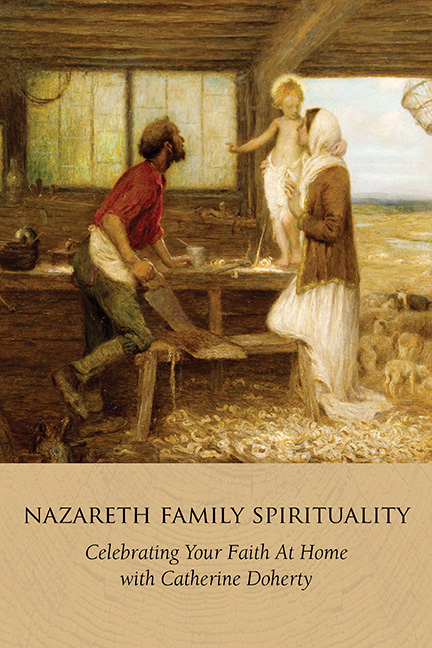It was an exciting day when I received Nazareth Family Spirituality: Celebrating Your Faith at Home with Catherine Doherty in the mail. I had seen it, newly minted, on the Madonna House bookshelves and eyed it longingly, so it was a real treat when I could finally crack the cover.
While the heart of this book consists of Catherine’s meditations on marriage and family, many taken from the old Dear Parents book, I have situated these within the context of Catherine’s meditations on the Holy Family’s hidden years at Nazareth and how this profound event pertains to family life, a theme she is an undisputed genius at mining meditations from and a place her contemplative heart constantly dwelt.
My excitement was warranted. I was not disappointed—not in the least. In fact, having read it I feel the book is a must-have for any Catholic couple living within their own Sobornost or Trinity of Persons and desiring to bring each other, and their children, to Christ. Around the corners of every page are anecdotes, deeply practical thoughts, and answers to questions about every facet of family life you can imagine. Particularly interesting to me was the section dedicated to handing on the Faith through celebration. Within this section are concrete ways to bring the liturgical year to life within the home. Catherine recalls the rich customs and traditions she had growing up in Russia, and adds customs from everywhere else—from the Baltic tradition of blessing every doorway at Epiphany to the Eastern European custom of breaking the Holy Saturday fast, after the vigil, with the cottage cheese Paska, a hardboiled egg, and the Koolitch bread.
The liturgical cycle of customs at Madonna House is drawn from all over the world. From the popular Mexican celebration of Our Lady of Guadalupe on December 12 to the Scandinavian customs surrounding the St. Lucy celebration the next day on December 13, or the Baltic custom of marking door lintels for the Epiphany blessing, these traditions have been gathered from around the globe. … Through these cycles, celebrated in the Sacred Liturgy and through the daily Liturgy of the Hours, we sanctify time by consecrating it to God.
Catherine felt that the riches of Christian culture had been lost in so many parishes and dioceses due to secularism that she would often repeat the saying of Christ: “Gather up the fragments left over, that nothing may be lost.” She truly had a deep love and a burning desire for families to live fully in Christ, and her love shines out clearly within the pages of this book.
Yet there is not only practical wisdom within Nazareth Family Spirituality, but also a goldmine of spiritual and psychological wisdom. Catherine had come to be known as a staritza or “Spirit-filled elder and guide in the Christian life” in her time, so there is much upon which we can meditate. Like she said in one of her last filmed interviews: “God loves you—get that straight! God loves you! Allow yourselves to be beloved by God, because he loves you. God loves you.”
And the wisdom contained in the book is not Catherine’s alone. In answer to a question about whether a wife should work to get a house on a better street, in addition to Catherine’s thoughts direct quotes are taken from Mulieris dignitatem (the Apostolic Letter on the Dignity and Vocation of Women), Familiaris consortio (the Apostolic Exhortation on the Christian Family in the Modern World), and the encyclical Laborem exercens (On Human Work). And the answer fills four pages—it is not just “No. Let us move on.”—but rather the editor, through the thoughts and wisdom of Catherine and the Church, draws the reader to really examine what is at stake when a mother works outside the home, and then gets the reader to ask herself the question, “Is it worth it for me?”
There are worse ways you could spend the $15 or so it costs to purchase this book. It is well worth the money. In fact, it would be a fantastic wedding gift for a couple just starting to build their own set of traditions and customs. My new copy already looks old—it has been dog-eared and underlined and it will be well used in the coming years. I have come to deeply admire Catherine Doherty through her writings and through the experiences I have had with Madonna House. I hope that this book will be the start of something similar for you.












